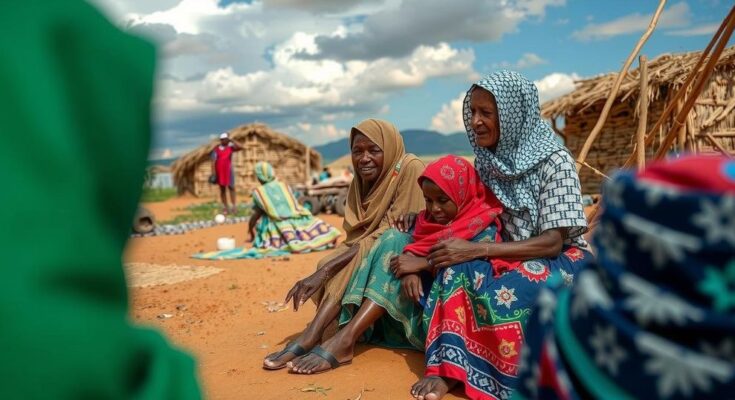A recent EJF report reveals that Somali climate refugees in Dadaab are facing a worsening crisis due to a new wave of climate disasters and extreme weather events, leading to increased displacement and significant food insecurity. Personal stories from refugees highlight the severe impact of climate change on their lives and livelihoods. The report calls for immediate international support and the establishment of legal protections for climate refugees.
A new report from the Environmental Justice Foundation (EJF) highlights a dire situation for Somali climate refugees in the Dadaab Refugee Camp, exacerbated by recent climate disasters. The report indicates that flooding in 2024 has led to increased displacement throughout the Horn of Africa, particularly affecting those who have already been marginalized. Extreme weather events, worsened by climate change, have caused a significant rise in internal migration, with over 32.6 million people displaced in 2022, up from an average of 23.6 million per year between 2013 and 2023. The report sheds light on the ongoing struggles of the population in Dadaab, originally built to house 90,000 individuals, which has since ballooned to over 320,000 due to worsening drought conditions and conflict. The harsh climate has devastated the livelihoods of many residents, leading to soaring food insecurity that saw nearly half of Somalia’s population requiring emergency assistance in 2023. Many families have lost their livestock and crops, forcing them into life-threatening situations. Personal testimonies from refugees illustrate the extreme circumstances they face. A single mother in Dadaab lamented the loss of her cattle, stating she is left with nothing to care for her children. The refugee population has only increased as the region has oscillated between drought and severe flooding, compounding the humanitarian crisis. The EJF emphasizes that immediate and substantial international assistance is essential to address the needs of these climate refugees. The EJF’s report calls attention to the urgent need for global action to protect those who, despite contributing minimally to global emissions, are suffering the most from its consequences. The organization urges for the creation of legal frameworks that specifically safeguard climate refugees and calls for swift and decisive action to mitigate climate change and ensure the protection of human rights for those most affected by environmental disasters.
In recent years, the Horn of Africa has experienced increasingly severe climate disruptions, leading to substantial migration and displacement as individuals and families are forced to flee their homes. The Dadaab Refugee Camp in Kenya presents a stark example of this phenomenon, housing a population that has swelled due to ongoing droughts and conflicts stemming from climate-related impacts. Previous reports have documented escalating internal displacement caused by the doubling of extreme weather events linked to climate change, necessitating urgent intervention from both local and international communities to address the rising humanitarian crisis.
The Environmental Justice Foundation’s report underscores the urgent need for international action to support Somali climate refugees in Dadaab, who are facing compounded challenges from climate disasters. The alarming rise in both displacement and food insecurity warrants timely interventions to protect these vulnerable populations. As climate change continues to inflict devastation, it is imperative for global leaders to prioritize the establishment of protections for climate refugees to uphold their fundamental human rights and ensure their future well-being.
Original Source: ejfoundation.org




